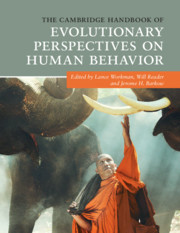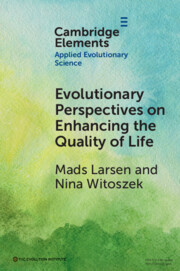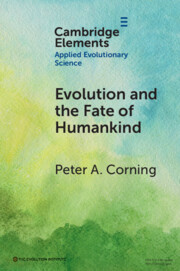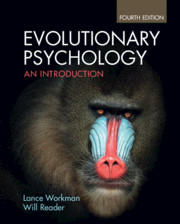The Cambridge Handbook of Evolutionary Perspectives on Human Behavior
The transformative wave of Darwinian insight continues to expand throughout the human sciences. While still centered on evolution-focused fields such as evolutionary psychology, ethology, and human behavioral ecology, this insight has also influenced cognitive science, neuroscience, feminist discourse, sociocultural anthropology, media studies, and clinical psychology. This handbook's goal is to amplify the wave by bringing together world-leading experts to provide a comprehensive and up-to-date overview of evolution-oriented and influenced fields. While evolutionary psychology remains at the core of the collection, it also covers the history, current standing, debates, and future directions of the panoply of fields entering the Darwinian fold. As such, The Cambridge Handbook of Evolutionary Perspectives on Human Behavior is a valuable reference not just for evolutionary psychologists but also for scholars and students from many fields who wish to see how the evolutionary perspective is relevant to their own work.
- Brings together experts from a wide range of fields, including evolutionary psychology, ethology, human behavioral ecology, sociocultural anthropology, biology, neuroscience, and media studies
- Introduces both theoretical and applied issues, making these accessible to students and scholars without specialized training in evolutionary theory
- Includes up-to-date findings with regard to mechanisms underlying evolutionary change
Reviews & endorsements
'This book is a state-of-the-art compendium for understanding human nature. Chapters range from traditional Darwinian concerns about topics like mating and morality through to contemporary issues such as psychopathology and the impacts of social media. This handbook is as appealing for students as it is for professional scholars.' Richard Wrangham, Ruth B. Moore Professor of Biological Anthropology, Harvard University, and author of Catching Fire: How Cooking Made Us Human
Product details
April 2020Paperback
9781316642818
578 pages
279 × 217 × 27 mm
1.63kg
22 b/w illus. 21 tables
Available
Table of Contents
- Introduction
- Part I. The Comparative Approach:
- 1. Human-grey parrot comparisons in cognitive performance
- 2. Cognitive abilities in elephants
- 3. Culture and communication among cetaceans
- Part II. Sociocultural Anthropology and Evolution:
- 4. Eusociality in humans
- 5. The nature and psychological foundation of social universals
- 6. The study of culture and evolution across disciplines
- Part III. Evolution and Neuroscience:
- 7. Are evolutionary psychology and the neuroscience of motivation compatible?
- 8. Are we designed to be happy? The neuroscience of making sense of pleasure
- 9. Environmental pressures on transgenerational epigenetic inheritance: an evolutionary development mechanism influencing atypical neurodevelopment in autism?
- Part IV. Group Living – The Evolution of Social and Moral Behavior:
- 10. The problem of altruism and future directions
- 11. Can evolutionary processes explain the origins of morality?
- 12. The evolution and function of third-party moral judgment
- 13. Evolution of the human family
- 14. The parasite-stress theory of cultural values and sociality
- 15. The evolution of pride and shame
- 16. Thinking outside the head: cognitive ecologies and evolutionary psychology
- Part V. Evolution and Cognition:
- 17. Runaway processes in modern human culture: an evolutionary approach to exaggerated communication in present human societies
- 18. Ontogeny of tactical deception
- 19. The evolution of language: a Darwinian approach
- 20. The adaptive problem of exploiting resources: human foraging behavior in patchy environments
- Part VI. Evolution and Development:
- 21. Evolutionary developmental psychology: developing adaptations in infancy and childhood
- 22. The ontogeny and evolution of cooperation
- 23. Genomic imprinting is critical for understanding the development and adaptive design of psychological mechanisms in humans and other animals
- 24. Evolutionary explanations for bullying behavior
- 25. Birth order and evolutionary psychology
- Part VII. Sexual Selection and Human Sex Differences:
- 26. Survival, selection, and sex differences in fear
- 27. The enigmatic urge: how sexual desire works
- 28. Are humans peacocks or robins?
- 29. Human mate selection: a multidimensional approach
- 30. Kin selection and the evolution of male androphilia
- 31. Evolutionary psychology: thoughts on integrating feminist perspectives
- Part VIII. Abnormal Behavior and Evolutionary Psychopathology:
- 32. Psychopathology from an evolutionary perspective
- 33. Are we on the verge of Darwinian psychiatry?
- 34. The evolution of prosocial behavior: from caring to compassion
- 35. Disordered social cognition: alexithymia and interoception
- Part IX. Applying Evolutionary Principles:
- 36. A bridge too far? Evolutionary psychology and the solutions of social problems
- 37. The evolution of personality
- 38. Applying evolutionary principles to criminality
- 39. Substitute parenting
- 40. Historians and the evolutionary approach to human behavior
- 41. The psychology of extraterrestrials: the new frontier?
- Part X. Evolution and the Media:
- 42. Daily talk shows as virtual gossip communities
- 43. Supernormal stimuli in the media
- 44. An evolutionary approach to horror media
- 45. The internet is for porn: evolutionary perspectives on online pornography
- Index.








